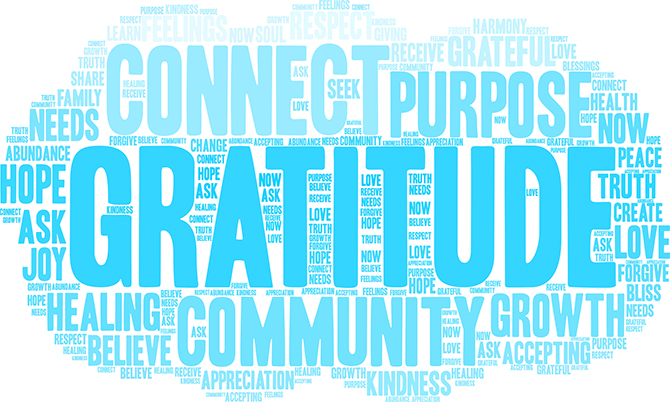GIVING GRATITUDE

By Dr. Peter Kalellis
We often take for granted many valuable and beautiful aspects of our lives. A lack of gratitude can lead to self-destructive behavior such as lack of joy, creativity, motivation, aspects of life that result in a state of unhappiness. Not a pretty picture, but it results in passivity and unresolved misery.
Our realization of what is most important in life goes hand in hand with gratitude for what is currently available to us. Reality points out that both abundance and lack of abundance exist simultaneously in our lives. It is always our conscious choice which secret garden we will tend when we choose not to focus on what is missing from our lives. But we are grateful for the abundance that’s present—love, health, family, friends, work, and personal pursuits that bring us happiness.
Before calling for a national day of fasting, President Abraham Lincoln stated, “We have been the recipients of the choicest blessings of heaven. We have been preserved, these many years, in peace and prosperity. We have grown in numbers, wealth, and power as no other nation ever has grown; but we have forgotten God! We have forgotten the gracious Hand which preserved us in peace, and multiplied and enriched and strengthened us; and we have vainly imagined, in the deceitfulness of our hearts, that all these blessings were produced by some superior wisdom and virtue of our own.”
A MATTER OF TIME
This is a tremendously powerful statement! Since the time President Lincoln gave this speech, the wealth, prosperity, and peace experienced by the United States are far greater—along with the attitude of pride, selfishness, and ingratitude. But if this same speech were given today, there would be quite an uproar! In contrast to Lincoln’s day, or even to fifty years ago, today’s ungrateful attitude is worse by far. If that generation forgot God, and the many blessings He provided for America, then this present generation doesn’t even know God exists! In this world of being obsessed with what’s “in”—from the newest fashions, to the latest songs and absurd political correctness—gratitude has been all but declared unconstitutional!

Parents I have often counseled have complained about the lack of gratitude of their teenagers. It is by far one of the most difficult times that many parents experience. When I sense that a client has confidence in my work, I try to share the wisdom of my professor, Dr. Herbert Holt who said that children were not designed to make their parents happy. Parents have been designed to make them happy. Some parents respond that they do their best to see that their children are healthy and happy. Recently, one mother said, “I don’t expect to be praised as the mother of the year, I certainly would like to be appreciated.” Another mother added, “Oh well, I guess we are not alone, but an occasional ‘thank you’ would suffice to make me happy.” An older parent whose children were now adults said, “I will always wish I could have done more for my children. Who doesn’t want to give them everything? But it doesn’t always work that way.” This particular parent did not realize that by giving children so much, they come to expect more and more, and that actually deprives them of the ability to be happy—because they have less and less gratitude.
HAVING IT ALL?
Recently, a client, we will call Ted, came to me for therapy. His main issue was depressive feelings and unhappiness. In his early forties, he had a good job, was married to a lovely and kind woman who had a high position in a large firm; he loved his wife, and they owned a beautiful home. Why did Ted need therapy?
“Doc, I have everything I need in my life, but I’m an unhappy man.”
“What do you think is missing?” I asked.
“I don’t know,” he said.
“In therapy, ‘I don’t know’ means that you do know.”
“No, I don’t,” he said.
“Ted..., you may lack gratitude,” I said.
“Gratitude for what?” he asked rather annoyed. “I worked very hard to attain whatever I have, and nobody has given me anything.”
“What about the things that you take for granted?” I asked.
He paused, and after a brief silence he said, “what things?”
In today’s fast-paced world, most people seem to have no time for thankfulness. Work, traffic, family, soccer practice, doctor appointments, social events and countless other things are their top priorities. They seem to have no time for gratitude. One wonders why we have so many unhappy people in a country that enjoys plentiful food, shelter, electricity, running water, wealth, air conditioning, heating, transportation, sanitation, and many other blessings.
I looked at him straight in the eyes, and with a semi-smile, I said, “You have eyes that can see, ears that can hear, a brain that can think, hands that can work, feet that can walk. You are alive and healthy. Aren’t these givens worthy of some gratitude?” His response was “everybody has these!”
THE LITTLE THINGS
“Well, if you want to be happy, start your day by being grateful for the things that you take for granted. Some unknown author offers some practical thoughts,” I said and gave Ted the following list:
• Be thankful that you don’t already have everything you desire. If you did, what would there be to look forward to?
• Be thankful when you don’t know something, for it gives you the opportunity to learn.
• Be thankful for the difficult times. During those times you grow.
• Be thankful for your limitations because they give you opportunities for improvement.
• Be thankful for each new challenge, because it will build your strength and character.
• Be thankful for your mistakes; they will teach you valuable lessons.
• Be thankful when you’re tired and weary because it means you’ve made a difference.

Dr. Peter M. Kalellis is a psychotherapist, marriage and family therapist, lecturer, and writer. He has a doctorate in clinical psychology and is the author of many books. He maintains his practice in Westfield, New Jersey.




